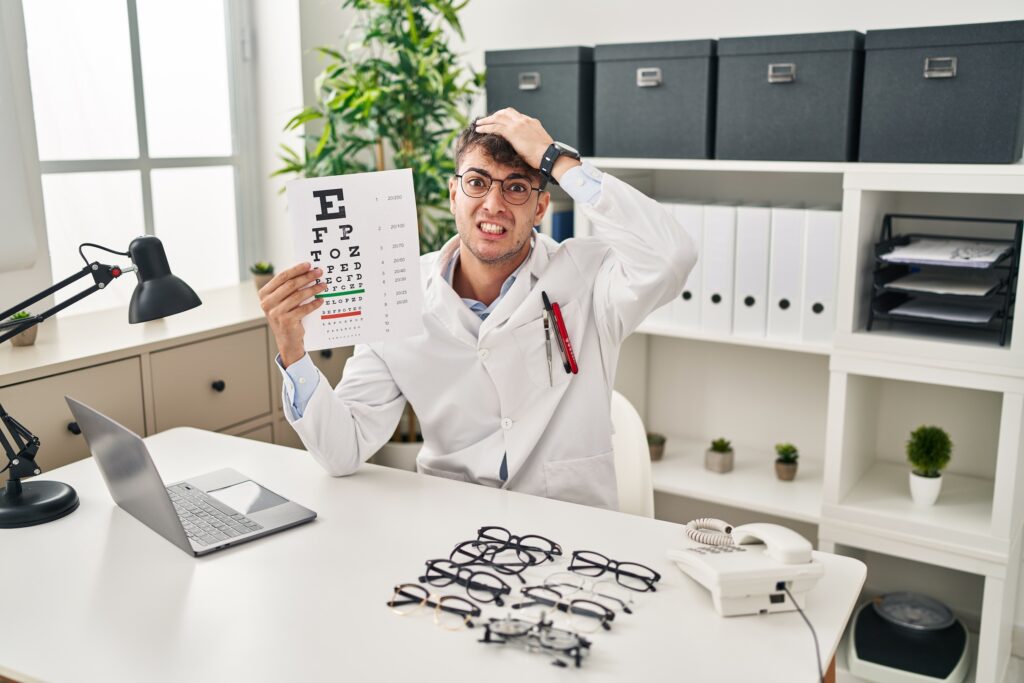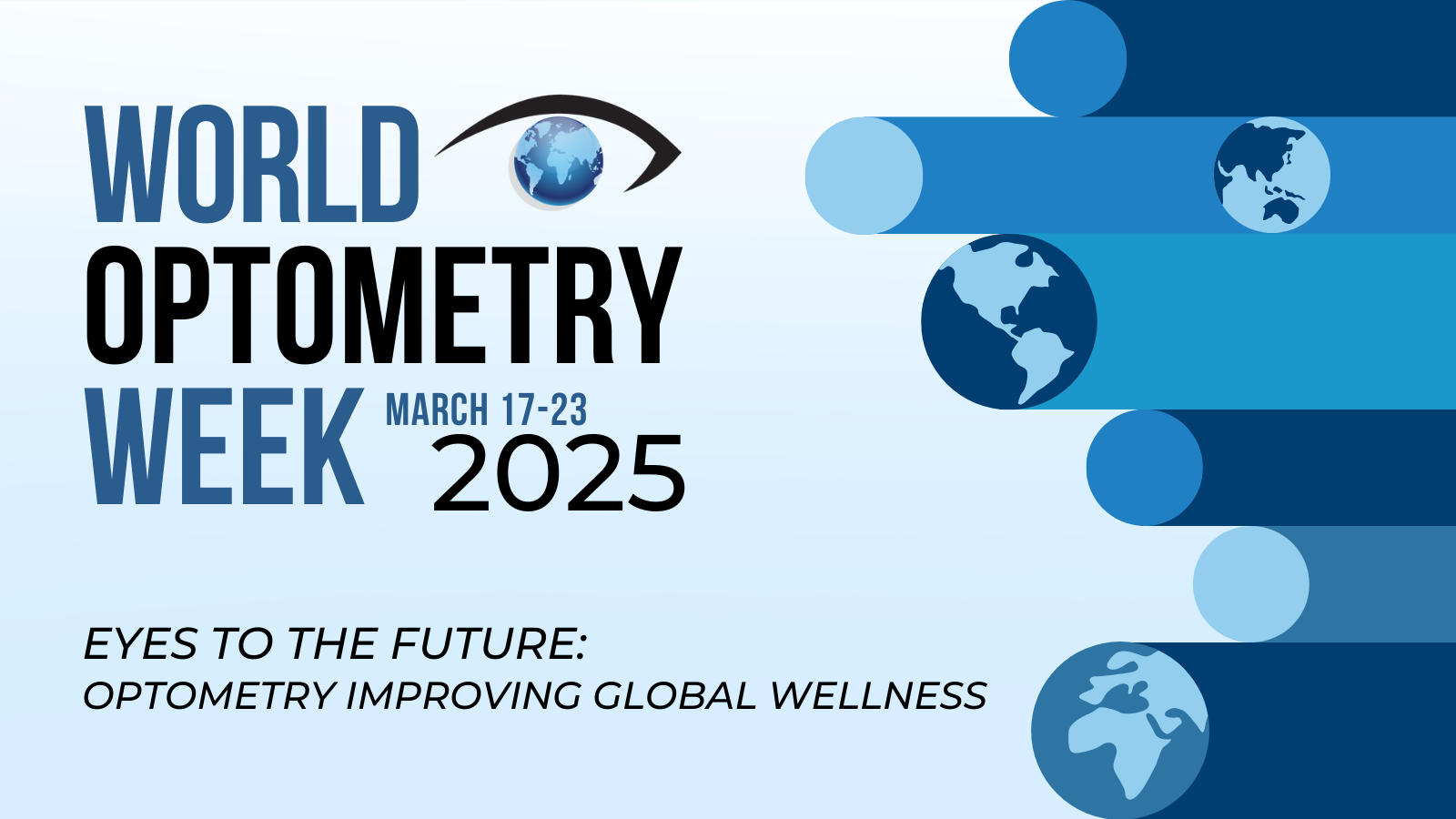As a professional in the optics industry, whether you are an optometrist, dispensing optician, or lab technician, you work in a fast-paced, high-precision environment. The demands of clinical accuracy, patient expectations, and ongoing professional requirements can make the role feel relentless, often leaving little room to focus on your own development.
Yet investing in your growth is essential for long-term fulfilment and career satisfaction. Balancing a busy schedule with meaningful professional progression is not only achievable but crucial. In this blog, we explore practical strategies to help you advance in your career, protect your wellbeing, and find opportunities that truly support your ambitions.
The optical sector has evolved rapidly. Technological advances – from OCT (Optical Coherence Tomography) to tele-optometry – have raised the bar for clinical standards, but they also demand continuous learning. Meanwhile, customer expectations are higher than ever, as patients expect fast, friendly, and expert service.
Administrative tasks further compound the challenge: maintaining accurate patient records, ordering and managing stock, and communicating with other healthcare providers all take up significant time. For many in optics, it can feel like you’re always “on call” for both the clinical and business sides of practice.
In addition, regulatory and professional requirements continue to tighten. The General Optical Council (GOC) mandates a structured CPD system – one that spans a three-year cycle and requires registrants to earn points across several core domains such as clinical practice, communication, leadership, and professionalism.
All these pressures add up. Without a deliberate strategy for growth, it’s easy to let development fall by the wayside.
In a high-pressure field like optics, it's easy to view personal growth as a luxury – something you do after all the clinical work is done. However, personal growth is not just about learning a new skill; it's the foundation for a sustainable, resilient, and truly excellent career.
Here is why dedicating time to your growth is essential:
Personal growth does not take away from your professional hours; it protects you from the emotional and mental strain of clinical work. Activities outside the clinic — such as exercise, hobbies or short mental breaks — build resilience and help you respond calmly to challenging situations. When you feel balanced, you are better able to maintain energy and long-term quality in patient care.
Mandatory CPD keeps you compliant, but deeper learning drives real excellence. Investing time in expanding your clinical knowledge allows you to adopt new technologies and techniques, from advanced dry eye treatments to specialist co-management pathways. This expertise improves patient outcomes and strengthens your reputation as a leading practitioner.
Repeating the same cases daily can lead to stagnation. Personal growth helps you rediscover your purpose by working towards a specialism or new career direction. For example, shifting from general practice to paediatric myopia management can bring renewed motivation and open doors to senior roles, creating a career that feels progressive rather than repetitive.
A rested, engaged clinician delivers stronger patient care. When you are not drained by burnout, you communicate more clearly, show greater empathy and manage difficult interactions with ease. Developing soft skills such as communication and conflict resolution strengthens rapport, boosts patient trust and leads to better treatment adherence and outcomes.

Effective time and energy management begins with reducing administrative friction, allowing you to conserve both physical and mental capacity for professional growth and wellbeing. Start by reviewing your clinical workflow to identify tasks that do not require your direct involvement. Technology can make an immediate impact: automated patient reminders, digital records and modern refraction systems save minutes with every appointment, preventing unnecessary fatigue over the course of a busy day.
Just as important is empowering your support team. Well-trained dispensing opticians and technicians can handle pre-tests, contact lens teaching and frame selections, enabling you to focus on the diagnostic and clinical responsibilities that truly require your expertise. Delegating appropriately not only improves efficiency but also creates a more sustainable working rhythm, helping you maintain energy for development outside of clinic hours.
Saying no can be challenging, but taking on extra projects when your schedule is full leads to burnout. Set clear limits and decline politely, framing refusals around current commitments, for example: "I would love to help, but I cannot give that project the attention it deserves until Q3."
Batch administrative tasks to protect focus and energy. Allocate 15 minutes at the start and end of your day for emails and non-urgent work, and silence notifications during clinical hours to concentrate fully on patients. This reduces task-switching, improves efficiency, and safeguards both wellbeing and care quality.
Continuous Professional Development (CPD) doesn’t have to feel like homework squeezed into a free Sunday. Instead, view it as a deliberate investment in your future. Focus on quality over quantity by selecting one or two high-impact skills that align with where you want your career to be in five years. For example, if your goal is to open a specialist dry eye clinic, dedicate your CPD to courses, journals, and peer discussions on that topic, ensuring a deeper expertise and better return on your time.
Integrate growth into your daily routine through micro-learning. Use 15 minutes of your lunch break to read a peer-reviewed article in your speciality, or listen to relevant optics podcasts and recorded CPD lectures during your commute. By embedding learning into everyday moments, you make professional development manageable, consistent, and directly applicable to your work.
When exploring new opportunities, it’s important to prioritise employers who support professional growth and wellbeing. During interviews, ask specific questions about development pathways, such as, “How does this practice support CPD?” or “Are there mentorship programmes available?” These questions signal that you value learning and growth, and they help you assess whether the role aligns with your long-term career goals.
Look for employers who actively demonstrate a commitment to staff development. This could include regular training sessions, protected time for CPD, or opportunities to specialise in clinical areas of interest. Choosing a workplace that invests in its team not only enhances your skills but also ensures a sustainable, fulfilling career where you can thrive professionally while maintaining balance and wellbeing.
Setting clear boundaries is essential to prevent burnout and protect your well-being. Your personal life should never be the default overflow for work. After your agreed-upon finish time, turn off work notifications and, if possible, place work phones or tablets out of reach, while clearly communicating urgent contact protocols with your team.
Equally important is scheduling non-negotiables. You would never cancel a patient appointment because you were tired or busy. Apply that same respect to your personal commitments. Block these in your calendar and prioritise true rest, such as deep sleep, meditation, or time in nature, rather than passive leisure. Doing so preserves mental energy, helps you recharge, and ensures you can return to work focused and resilient.
As a recruitment agency specialising in optics, we offer tailored support to help you grow both professionally and personally:
1. Role matching based on your goals: We don’t just fill vacancies; we find roles that align with your development priorities, whether that’s CPD, leadership, or specialisation.
2. Advocacy for development time: We work with practices that value continuous learning and are open to negotiating study leave or flexible working.
3. Career guidance: We help you create or refine your PDP (Personal Development Plan) and set realistic growth targets.
3. Mentorship and networking: Through our connections, we can help you identify mentors or peer groups that support reflective practice and career advancement.
Balancing work and personal growth in a demanding field like optics isn't about working less; it's about working smarter and living intentionally. By streamlining your clinical day, being strategic about your CPD, fiercely protecting your personal boundaries, and collaborating with Verovian Optical Agency, you ensure that your career is a marathon, not a sprint. This strategic approach will ultimately lead to a more fulfilling career, reduced burnout, and happier patients.
Ready to take the next step? Register with us today, and let’s find you a role that offers the right balance of growth, challenge, and wellbeing.
For owners and practice managers of UK optical clinics, winter is far more than a seasonal shift; it is a high‑stakes period of elevated patient demand, operational complexity, and revenue opportunities. Shorter daylight hours, indoor screen overload, winter illnesses, and the post‑holiday surge in appointments all combine to create one of the busiest times of year for the high‑street optician.
According to the General Optical Council (GOC) 2024 Workforce Survey, 54% of optical professionals reported feeling unable to cope with their workload, and staff dissatisfaction continues to rise. For practice owners and managers, this means the winter rush requires much more than simply keeping the doors open. To thrive, you must plan strategically by recruiting and scheduling the right staff, improving your patient flow systems, and positioning your practice to capitalise on seasonal trends rather than scrambling to respond.
This guide delivers practical steps for staffing, patient care and operational readiness so you can hit winter 2025 not just surviving but growing.
Winter in the UK brings predictable spikes in patient demand and operational challenges:
The College of Optometrists notes that central heating and low indoor humidity exacerbate dry-eye symptoms, creating seasonal demand for products and treatments.
By anticipating these patterns, managers can prevent disruptions and ensure smooth operations even during peak periods.
Analyse 2023–24 winter appointments and walk-in trends to identify peak weeks and high-demand days. This informs rotas, preventing overbooking and understaffing.
Engage locums or part-time optometrists ahead of winter. Verovian Optical Recruitment Agency provides UK-specific recruitment solutions for temporary or permanent coverage.
Create adaptable rotas to cover sickness, holidays, and weather-related delays. Consider staggered shifts and on-call staff for peak periods.
Enable team members to assist in multiple roles, reception, pre-testing, or dispensing, so unexpected gaps don’t disrupt patient flow.
Introduce winter-shift incentives, recognise contributions, and maintain open communication to keep morale high.
Track appointment wait times, staff utilisation, and patient satisfaction. Use this data to refine staffing strategies in real time.

Use SMS, email, or waiting-room displays to educate patients on winter-specific eye health: dry-eye relief, glare protection, and screen-time management.
Pre-screening forms, automated reminders, and targeted staff allocation reduce bottlenecks, speeding up consultations without compromising care.
Train staff to suggest anti-reflective lenses, screen-protection options, and protective frames to address seasonal concerns.
Ensure waiting areas are warm, well-lit, and welcoming, which is especially important during cold or wet weather.
Encourage annual reviews, eye-health plans, and product upgrades to capture additional revenue while reinforcing patient loyalty.
Pre-order winter essentials: lubricating drops, anti-reflective coatings, screen-protection lenses, and popular frame lines. Avoid stockouts that impact revenue and patient experience.
Service diagnostic machines, adjust lighting, and check HVAC systems to prevent winter-related disruptions.
Please make sure online booking, SMS reminders, and recall software are functioning efficiently to manage patient volume and free staff time.
Implement marketing campaigns like “Winter Vision Comfort Package” or “Screen-Smart Winter Eyes” to boost bookings and showcase your practice’s expertise.
Promote flu vaccinations, maintain cleaning protocols, and ensure staff wellbeing initiatives are in place to minimise absenteeism.
Partnering with Verovian optical recruitment agency ensures your practice navigates winter efficiently and profitably.
We maintain a vetted network of locum optometrists, dispensing opticians, and support staff ready to cover seasonal peaks.
From short-term shifts to permanent placements, we provide solutions that match your workflow and culture.
Our expertise extends beyond staffing; we advise on workload optimisation, rota planning, and winter demand forecasting.
Winter doesn’t need to be a period of stress; it’s a strategic opportunity. By proactively managing staffing, patient care, and operational systems, UK optical practices can deliver exceptional service, improve revenue, and maintain a motivated team.
Well-prepared managers not only survive the winter rush, they thrive, strengthening their practice’s reputation and positioning themselves for long-term growth.
Partner with Verovian for recruitment and operational guidance so your practice can navigate winter 2025 confidently.
Every year, the second Thursday of October is marked as World Sight Day, a global initiative dedicated to raising awareness about eye health, vision impairment, and the vital role eye care professionals play in our communities. In 2025, this important day falls on October 9th, and it offers an opportunity for everyone – from patients to practitioners – to focus on the importance of protecting and improving vision.
This blog explores the importance of World Sight Day, highlights the vital role of optical professionals, and demonstrates how Verovian Optical Recruitment Agency supports both practitioners and employers in building a strong, skilled workforce across the UK.
Vision is one of our most precious senses, yet around the world, millions of people suffer from preventable or treatable eye conditions. In the UK, conditions such as glaucoma, cataracts, macular degeneration, and diabetic retinopathy affect thousands each year, indicating the importance of accessible, high-quality eye care.
World Sight Day reminds us that eye health is not just a personal responsibility but a public one. It encourages early detection, regular eye examinations, and the promotion of awareness about how lifestyle, age, and systemic health conditions can impact vision.
The official theme for World Sight Day 2025 is “Love Your Eyes”. It encourages people to prioritise their eye health through preventive care, early detection, and lifestyle choices that protect their vision.
The campaign is led by the International Agency for the Prevention of Blindness (IAPB) in partnership with the World Health Organization (WHO), with UK support from organisations like RNIB and Sight Savers. These organisations promote awareness, community screenings, and education to reduce avoidable vision impairment.
For optical professionals, the theme highlights the critical role of skilled practitioners in protecting vision and ensuring accessible, high-quality eye care.

Optometrists, ophthalmic nurses, optical assistants, and dispensing opticians are the frontline guardians of eye health. They play a crucial role in:
1. Detecting early signs of eye disease
2. Providing accurate prescriptions for glasses and contact lenses
3. Educating patients about preventive eye care
4. Supporting patients with long-term vision conditions
Whether you work in optical care or want to prioritise your own vision, there are several ways to get involved:
World Sight Day 2025 serves as a timely reminder of the growing demand for skilled optical professionals. At Verovian Optical Recruitment Agency, we recognise the essential role these professionals play in safeguarding vision and enhancing the quality of life across the UK. Whether you are an experienced practitioner or just starting your career, we are committed to connecting you with rewarding temporary or permanent opportunities that align with your skills and ambitions.
We place opticians, optometrists, and ophthalmologists across hospitals, retail, community, domiciliary, and other clinical settings, ensuring organisations have the expertise needed to deliver exceptional patient care. Through rigorous screening and vetting, we match professionals with roles suited to their experience while providing continuous support to optimise recruitment and strengthen teams.
By joining our network, you gain access to exclusive roles, career development resources, and expert guidance. At the same time, optical practices benefit from dedicated, highly skilled staff ready to make a real difference. Together, we help build a strong, capable optical workforce across the UK.
World Sight Day 2025 is more than a day on the calendar – it’s a call to action. It’s a day to celebrate the life-changing work of optical professionals, promote eye health awareness, and encourage everyone to take steps to protect their vision.
At Verovian Optical Recruitment Agency, we are proud to support optical professionals in their mission to deliver excellent care. Ready to take the next step in your career? Register with Verovian Optical Recruitment Agency today and start exploring exciting opportunities that align with your expertise and aspirations.
Contract negotiation is one of the most important stages in an optical career, whether you are a newly qualified optometrist entering your first role or an experienced practitioner considering a new contract. A well-negotiated agreement sets the tone for your professional journey, helping you secure fair compensation, retain work-life balance, and align with your long-term career goals. Poorly negotiated contracts, on the other hand, can create stress, misunderstandings, and even litigation if disputes arise.
This guide explores the key aspects of contract negotiation in UK optometry, offering practical strategies, market insights, and red flags to help you navigate the process with confidence.
The first step before receiving the contract is clarifying your employment status. Are you an employee, a worker, or self-employed? Each category affects your rights and negotiating power.
Your status will shape which clauses are negotiable and how to frame your requests. It is important to understand the GOV.UK Employment Status Guide to ensure compliance with the law.
Successful negotiation is not about asking for what you need but highlighting the value you bring. Position your skills, subspecialties, and commitment to patient care as assets that will help the practice grow and retain patients. This shifts the conversation from personal gain to mutual benefit.
Ensure your contract specifies salary, locum rates, or hourly pay. Look for details on whether earnings are fixed, based on production, or linked to patient volume. This avoids misunderstandings and supports transparent discussions during future renegotiations.
Do not overlook fringe benefits. An employment contract should outline paid time off (PTO), vacation time, CPD or continuing education allowances, malpractice insurance coverage, association dues, and licensing fees. These extras are negotiable and can add significant value even if the salary is fixed.
Examine renewal provisions at the outset. A contract should state whether renegotiation is possible and clarify what happens if either party wishes to terminate. Pay attention to what amounts may be owed on termination and whether clauses allow the practice owner to change terms upfront without mutual consent.
Carry out due diligence before negotiations. Research market pay rates, review current market conditions, and understand the economic climate for UK optical practices.
One of the most effective negotiation tips is to benchmark against reliable salary data. The College of Optometrists provides guidance on typical salaries, helping you set realistic expectations.
Not every aspect of the contract is negotiable. Decide which terms to prioritise - whether that is higher pay, more paid holidays, flexible scheduling, or support for career consulting and continuing education.
Use the art of negotiation to position requests as a return on investment. Instead of “I need higher pay,” demonstrate how your expertise in certain optometric subspecialties or ability to handle high patient turnover supports the practice’s growth.
If you encounter complex clauses such as non-compete restrictions, malpractice insurance responsibilities, or contractual indemnities, it may be wise to seek professional guidance. For example, the AOP offers contract-checking services, while ACAS provides legal frameworks on UK employment contracts.

Understanding salary benchmarks provides leverage for successful negotiation. Salaries in UK optometry vary significantly depending on demographics, location of the practice, and employment setting.
Packages may be higher in high-demand regions or niche optometric subspecialties. When reviewing a new contract, look beyond salary alone. Evaluate the full benefits package, including CPD funding, vacation time, relocation support, flexible scheduling, and a healthy work-life balance. These additional terms often make a role more attractive than one offering a slightly higher base salary.
Certain aspects of the contract should trigger caution. Common red flags include:
If any of these appear in your contract, seek professional advice before signing.
As a specialist UK optical recruitment agency, we do more than connect professionals with opportunities. We help you secure contracts that align with your career goals and protect your interests. From highlighting current market conditions to flagging negotiable clauses, our consultants provide tailored guidance at every stage.
Whether you are a new optometrist entering the interview process, a locum seeking flexible arrangements, or an experienced professional moving into private practice, we help you successfully negotiate fair, transparent, and sustainable agreements.
Contract negotiation is not just about pay; it’s about aligning your professional value with fair terms and a supportive environment. By conducting due diligence, spotting red flags, and applying practical negotiation tips, optical professionals can secure contracts that promote career growth, stability, and satisfaction. With the right preparation and the support of a trusted recruitment partner, you can master the art of negotiation and secure opportunities that match your ambitions.
At Verovian Optical Recruitment Agency, we specialise in connecting optometrists and optical professionals with practices across the UK. From reviewing employment contracts to offering career consulting, we’ll help you navigate negotiations and secure fair, rewarding roles.
Contact us today to explore current opportunities and take the next step toward your career goals.
As a manager in optical practice, you are the cornerstone of your team’s culture. You set the tone, enforce the standards, and, most importantly, create an environment where every staff member feels safe, valued, and respected. However, recent findings from the General Optical Council (GOC) have brought a stark reality into focus: harassment, bullying, and discrimination are pervasive issues within the optical sector, casting a shadow over the well-being of dedicated professionals.
This is not simply a compliance issue; it’s a strategic imperative. A negative workplace culture can have a direct impact on your team, your patients, and your practice’s bottom line. This guide provides a clear roadmap for optical practice managers, offering actionable strategies to address these challenges head-on and cultivate a genuinely positive and resilient workplace culture.

While harassment is a moral and ethical failing, it also has a tangible effect on business performance. The GOC's Registrant Workforce and Perceptions Survey revealed that many optical professionals have faced mistreatment in the workplace. Instances reported included physical, verbal, or cyber-bullying; discrimination on the grounds of gender, religion, race, or sexuality; workplace harassment, frequently of a sexual nature; and abusive language or aggressive behaviour from patients. This isn't just about emotional distress; it's a direct threat to your practice's productivity.
In an industry where teamwork and collaboration are essential, staff who face mistreatment often struggle to focus on delivering high-quality patient care. Instead, their focus shifts from providing excellent patient care to managing a hostile environment. Over time, this can lead to:
Employees who feel undervalued or disrespected are far less likely to be engaged with their work or committed to the practice's goals. This can manifest as a lack of initiative, disinterest in professional development, and a general feeling of disillusionment.
A toxic environment drives staff away. The research noted that job satisfaction is dipping, and many professionals are considering leaving the sector entirely. High turnover is expensive, time-consuming, and disrupts team cohesion and continuity of patient care.
The constant stress of a hostile work environment takes a severe toll on an individual’s mental health. Professionals subjected to harassment and bullying often experience increased levels of anxiety, stress, and even depression. This emotional and psychological burden can make it difficult for them to focus, think clearly, and maintain the resilience needed to perform their duties effectively, leading to burnout.
The personal toll of mistreatment can directly impact a professional's ability to provide safe and compassionate care. A practitioner who is stressed or anxious may be unable to give their full attention to a patient, potentially compromising the quality of the service provided.
Ultimately, unaddressed negative behaviours create an "unseen cost" to your practice, eroding morale and undermining the very foundation of your business.

Building a positive, resilient workplace is not an overnight task; it is an ongoing commitment that carries both moral and legal weight for managers. Beyond improving morale, healthcare managers have a statutory duty to ensure the safety of staff, encompassing both physical and psychological well-being. Employers in the UK are bound by the Equality Act 2010 to prevent discrimination and create inclusive environments. They must also uphold their duty of care to protect staff from harm. By taking a proactive and structured approach, practices can build a culture where every member of staff thrives while meeting these critical responsibilities.
Practical steps for managers include:
Your first step is to establish clear and non-negotiable boundaries.
Implement a Zero-Tolerance Policy: Create a clear, written policy that explicitly defines what constitutes harassment, bullying, and discrimination. Ensure it covers all forms of mistreatment, from verbal abuse to inappropriate comments on social media. This policy should be a non-negotiable part of every employee's contract.
Mandate Regular Training: Initial training is essential, but ongoing education is critical. Schedule regular sessions on topics like unconscious bias, respectful communication, and conflict resolution. Consider incorporating real-world scenarios relevant to an optical practice to make the training more impactful.
Clarify a Code of Conduct: A simple, yet powerful, code of conduct can set the tone for your practice. It should outline the expected professional behaviours and ethical standards for all staff.
Creating a safe space for your team to speak up is crucial. The GOC’s research found that a lack of clear reporting pathways and a fear of retaliation were major barriers.
Promote an Open-Door Culture: Go beyond simply saying your door is open. Use regular one-to-one check-ins to create a safe space for your team to discuss any concerns, not just work-related ones. When someone comes to you, listen without judgement and assure them their confidentiality will be protected.
Establish Clear, Accessible Reporting Channels: Ensure every team member knows exactly who to talk to if they experience or witness a problem. This might be directly to you, a designated senior partner, or an external HR resource. The process must be simple, well-communicated, and easy to follow.
Leverage Employee Surveys: Consider implementing anonymous surveys to gauge morale and identify potential issues before they escalate. This can provide valuable insights into underlying tensions or systemic problems that employees may not feel comfortable discussing directly.
When an allegation is made, your response must be immediate, objective, and consistent. Your handling of these situations will significantly impact trust and the overall perception of fairness within your practice.
Listen Actively and Document Thoroughly: Take every report seriously. Listen carefully to the individual's account, allowing them to share their full story without interruption. Document all relevant details meticulously: dates, times, specific words or actions, location, witnesses, and the impact of the incident. Maintain strict confidentiality.
Conduct a Prompt and Impartial Investigation: As soon as an incident is reported, initiate a thorough and fair investigation. This involves interviewing all parties involved (complainant, alleged perpetrator, witnesses) and gathering any supporting evidence (e.g., emails, CCTV footage, communication logs). It is vital to remain neutral throughout the process, focusing solely on the facts.
After a thorough investigation, decisive action is crucial to reinforce your practice's values and policies.
Administer Appropriate Disciplinary Action: Based on the investigation's findings, take disciplinary action that is proportionate to the offence and consistent with your practice's policies. This could range from formal warnings to dismissal for gross misconduct. Consistency across similar incidents is vital for demonstrating fairness and upholding the integrity of your policies.
Provide Support and Follow-Up: Offer support to all affected parties. This might include access to counselling services or employee assistance programmes. Crucially, follow up with the individual who made the report to assure them that appropriate action has been taken (without disclosing confidential disciplinary details) and to ensure the negative behaviour has ceased.
Review and Learn: Use incidents as learning opportunities. What contributed to the problem? How can systems or training be improved to prevent recurrence? Regularly review your policies and procedures to ensure they remain effective and fit for purpose.
As an optical practice manager, your commitment to tackling harassment at work, bullying, and discrimination is more than just a managerial responsibility – it's a critical investment in the future of the profession. By building a culture where respect, safety, and inclusion are paramount, you not only protect your current team but also make your practice an attractive destination for top talent.
At Verovian Optical Recruitment Agency, we understand that the strength of your practice depends on the quality of your team. That’s why we specialise in connecting practices across the UK with highly skilled, carefully vetted optical professionals who can make an immediate impact.
We ensure every candidate we provide is not only exceptional in their clinical expertise but also committed to fostering a positive and respectful workplace culture. Partner with us to build a resilient, high-performing team that elevates your practice and delivers outstanding patient care. Get in touch with us today to start recruiting top optical talent for your practice.
With the UK’s ageing population and growing demand for home-based healthcare, domiciliary optometry is emerging as a vital and rewarding career path. As more patients face mobility challenges due to age, disability, or health conditions, the need for skilled optometrists delivering care outside the high street continues to rise. Whether you’re newly qualified or a seasoned professional seeking change, this guide offers a comprehensive look at the skills, rewards, and opportunities available in domiciliary eye care.
Domiciliary optometry involves delivering full-scope eye care services in patients' homes, residential facilities, or care homes. This mobile service enables patients who are housebound or unable to travel to receive essential sight tests and professional care.
This field is especially impactful for the elderly, individuals with low vision, and those in long-term care, ensuring continuity of eye care regardless of physical limitations.
Domiciliary eye care offers a compelling blend of flexibility, autonomy, and impact. Optometrists in this field often cite greater job satisfaction due to strong patient relationships and the ability to work Monday to Friday with more predictable hours.
Many domiciliary roles offer well-structured programmes with competitive salaries, access to professional support, and use of a company vehicle. Additionally, there are increasing opportunities for entrepreneurial optometrists to take part in service development, team leadership, or shared ownership models.
With the ongoing expansion of community-based healthcare and increased focus on reaching underserved populations, career opportunities in domiciliary optometry continue to grow across the UK.
Qualifying as a domiciliary optometrist involves a multi-step process:
Begin with a General Optical Council (GOC)-approved undergraduate degree in optometry from a UK university.
Following your degree, complete a structured pre-registration year under the supervision of a qualified optometrist. This includes practical assessments and the College of Optometrists’ final Scheme for Registration.
Once all pre-registration requirements are met, you must register with the GOC to practice legally as an optometrist in the UK.
Although not mandatory, training in safeguarding, dementia awareness, low vision, and manual handling is highly recommended to prepare for work with vulnerable populations.
Securing the right role is a pivotal step. Partnering with a Verovian Optical Recruitment Agency will significantly streamline this process, connecting optometrists with suitable and growth-orientated employers.
Most domiciliary employers offer comprehensive onboarding programmes that include practical training in the use of mobile equipment, patient communication strategies, lone worker safety, and daily logistics.
This pathway ensures that optometrists entering domiciliary care are clinically competent, practically prepared, and well-supported to deliver high-quality care in non-traditional settings.

In addition to core clinical competencies, domiciliary optometrists require a specialised skill set, including:
A domiciliary optometrist’s day revolves around visiting patients in their homes or care facilities, providing full eye exams and clinical assessments equivalent to those in a traditional clinic. They deliver expert care on the go using portable and specialised tools such as
Most employers provide this essential equipment, ensuring optometrists have access to the latest technology. Often accompanied by an optical assistant, they manage everything from patient care to dispensing glasses, making the process seamless and efficient.
After each visit, findings are carefully recorded and shared with the clinical team to guarantee ongoing patient support.
Gaining insight through shadowing an experienced domiciliary optometrist or exploring part-time roles is a great way to get started.
Further professional development can include:
While the role is fulfilling, it also comes with specific challenges:
Despite these, the rewards are significant. Offering personalised eye care to those unable to access traditional services provides emotional and professional fulfilment. The relationships built, flexibility achieved, and societal contribution made often outweigh the logistical difficulties.
Domiciliary optometry presents a distinctive and meaningful career within the broader eyecare profession. It offers a blend of clinical independence, personal fulfilment, and the chance to reach patients who need it most. Whether you’re exploring new challenges or seeking a more flexible, patient-focused role, domiciliary eye care may be the next step in your professional journey.
Ready to step into a rewarding career in domiciliary optometry? At Verovian Optical Recruitment Agency, we connect qualified optometrists with flexible, high-impact roles across the UK. Whether you're newly registered or looking for a fresh start, we’ll help you find the right fit. Start your journey with us today – Register now.
The NHS in England is undergoing a major transformation in 2025, reshaping how health services, particularly eye care, are delivered. With rising demand for hospital eye services and a pressing need to reduce waiting times, these reforms mark a pivotal step in ensuring the NHS is fit for the future.
This blog offers an up-to-date overview of the key pillars of the NHS 2025 eye care reforms, explores what they mean for optical practices and professionals today, and provides practical advice for adapting to this new landscape.
The NHS Eye Care Reforms 2025 are a set of nationally coordinated changes aimed at transforming how eye health services are delivered across England. Aligned with the NHS Long Term Plan, these reforms are designed to move services from overstretched hospital settings to more accessible community optical practices, making care more local, preventative, and efficient. By prioritising primary care and elective care access, the reforms aim to reduce wait times, improve patient outcomes, and support a transition from sickness to prevention. This updated model of care ensures NHS services are fit for the future, using community-based providers to deliver timely, high-quality care.
Established in April 2025, this pillar standardises urgent and emergency eye care across England. Led by NHS England and the College of Optometrists, it shifts care closer to home, easing hospital eye service demand and improving patient access and outcomes across the NHS.
Central to the 2025 health plan, this reform empowers optical practices to deliver urgent and elective eye care services previously provided in secondary care. Supported by NHS England, Integrated Care Boards, and Local Optical Committees, it strengthens primary care providers and promotes proactive, integrated care aligned with the NHS mandate.
Published in January 2019, the integration of primary and community care is an ongoing NHS development and a key pillar of the 2025 eye care reforms. Led by NHS England and Integrated Care Boards under the Department of Health and Social Care’s mandate, it aims to shift care from sickness to prevention, making health and social care more fit for the future.
As part of the 2025 reforms, expanding NHS optical voucher uptake improves access to essential eye care, especially among vulnerable populations. Streamlined eligibility and processes ensure equitable care delivery and support the government’s investment in NHS eye care to reduce health inequalities across England.
NHS England’s commitment to enhanced training equips optical professionals with the skills to manage urgent and minor eye conditions. This supports the expanded model of care by building a workforce capable of delivering high-quality eye care services closer to patients and reducing pressure on hospital eye services.
Critical to the reforms, upgrading optical practices’ systems to the NHS digital infrastructure enables electronic referrals and shared records. This digital integration facilitates coordinated care delivery, improves patient flow through eye care services, and supports the NHS’s broader move from analogue to digital health and social care.


The 2025 NHS Eye Care Reforms represent a critical opportunity for optical practices and professionals to lead in delivering accessible, preventative eye care. By embracing integration, digital innovation, and expanded clinical roles, the optical sector can meet rising demand, improve patient outcomes, and strengthen its position within the NHS.
These reforms create a pathway for optical practices to become integral to community eye care, thereby reducing hospital pressures and enhancing patient access. Practices that invest in digital infrastructure, workforce development, and collaborative networks will be best placed to thrive in this evolving landscape. Just so you know, the time to act is now. Position your practice and your team to meet the future of NHS eye care.
Partner with us for expert optical recruitment solutions. We connect practices with top professionals, helping you grow, innovate, and deliver exceptional eye care across NHS England in 2025 and beyond.
For internationally trained optical professionals, the UK presents exciting career opportunities in a well-respected healthcare system. However, before you can practice as an optometrist, you must be registered with the General Optical Council (GOC). This registration ensures that all professionals meet consistent standards in patient care and clinical practice.
In this blog post, we’ll walk you through the GOC registration process, explain the eligibility requirements, and provide tips to help you transition smoothly into the UK optical workforce.
The General Optical Council (GOC) regulates optometrists and dispensing opticians in the UK. Its mission is to protect the public by maintaining education, performance, and professional conduct standards. As an overseas‑qualified optometrist, GOC registration is mandatory—without it, you cannot legally examine eyes, prescribe lenses, or work in any UK optical practice.
To qualify for GOC registration, you must demonstrate that your overseas optometry education and clinical experience align with UK requirements. Specifically, you will need to show:

First, complete the self‑assessment form. A response will arrive by email within three working days, detailing any required documentation and, if eligible, the application form.
Before submitting your application form to the GOC, verify your qualifications through the Qualification Check (QC) using the link in your application email. This service carries a fee—see the QC website for current pricing. Follow the the step‑by‑step guide to complete the QC.
Once all required documents are received and your application is approved, you will be required to pay the assessment fee, which must be paid within 14 days.
If invited to interview, the interview fee must be paid within 14 days.
You will be notified of the outcome in writing. Possible outcomes:
The Scheme for Registration is the UK’s pre‑registration pathway for internationally trained optometrists. It helps you build the practical skills and knowledge you need in a UK workplace before achieving full GOC registration.
This comprises three parts:
Stage 1 and Stage 2 Work‑Based Assessments – Ongoing evaluations of your clinical competencies on the job.
Objective Structured Clinical Examination (OSCE) – A final practical exam that tests your hands‑on skills and decision‑making.
It takes up to two years and three months to complete the entire Scheme, although most trainees finish within about 15 months.
1. Apply online via the GOC website, but ensure you fill out the application identification form before you complete the application form.
2. Upload Documents: The completed application form and supportive documents should be emailed to [email protected].
3. Pay the Required Fee: As part of the international optometry registration process, you’ll be required to pay the following fees within 14 days of receiving each invoice:
£205 – Interview fee
£130 – Document scrutiny
£455 – Application assessment
4. Receive your GOC Registration Number and join the UK register of optometrists.
Stay Informed: Regularly check the GOC website for updates to OBS modules or exam format.
Becoming a GOC‑registered optometrist is your gateway to practising in the UK’s dynamic optical sector. While the process demands careful preparation—qualification assessment, possible bridging, pre‑registration practice, and final examination—thousands of international optometrists have successfully made the transition.
At Verovian Optical Agency, we specialise in connecting passionate and qualified optometrists with exciting opportunities across the UK. Whether you're just starting out or looking to take the next step in your career, our expert recruitment team is here to match you with roles that suit your skills, interests, and aspirations. We understand the optical sector inside and out, offering tailored guidance and ongoing support to ensure you thrive in your new position. From locum placements to permanent roles, we’re committed to helping you build a successful and fulfilling career in optometry. Ready to take the next step? Register with Verovian Optical Agency today and let us help you find your perfect role.
Working with children in an optical setting can be one of the most rewarding—and at times, most challenging—parts of an optometrist’s day. A young patient may walk in feeling shy, confused, or even fearful of what’s to come. For many, it’s their very first eye exam. That’s why mastering effective communication skills isn’t just helpful—it’s essential.
In this guide, we’ll explore practical strategies to help optometrists enhance their communication with paediatric patients, building trust, easing anxiety, and creating a positive experience that sets the foundation for lifelong eye health.
Children aren’t simply smaller versions of adults—they experience the world, and healthcare, in entirely different ways. Their communication skills are still developing, which often makes it difficult for them to articulate visual discomfort or specific symptoms. As a result, optometrists must adopt a flexible, child-centred approach that relies not only on verbal communication but also on keen observation and rapport-building. Being alert to unspoken signals —such as fidgeting, changes in facial expression, or avoiding eye contact—can often provide more insight than words alone.
To create a more accurate clinical picture, it's essential for a parent or carer to be present during the examination. They can provide key information and provide reassurance that helps the child feel more at ease. Ultimately, patience, empathy, and a genuine interest in the child’s well-being are key to successful paediatric eye examination and care. By understanding a child’s developmental stage and emotional needs, optometrists can build trust and foster cooperation, ensuring the experience is as positive and productive as possible.
The setting itself can make or break a child’s experience. A stark, clinical room may feel intimidating, whereas a bright, engaging space immediately puts young patients at ease and lays the groundwork for trust.
A welcoming atmosphere speaks louder than any reassurance you can offer verbally.
Children require a tailored approach, depending on their age and developmental stage:
This age-appropriate approach builds confidence and cooperation across all age groups.
One of the most effective ways to ease anxiety when examining children is to make the equipment and procedures feel familiar. Children feel more confident and cooperative when they understand what’s happening, especially if it’s explained in a fun, relatable way. Try using simple analogies like, “This is a camera that takes pictures of your eyes,” or “This machine plays a secret light game to check how well your eyes work.” Phrasing it like a game or adventure often sparks curiosity instead of fear.
Whenever possible, get the child involved. Let them press a button, hold a torch, or explore a mirror. Demonstrating a procedure on a toy or stuffed animal before doing it on the child can also be hugely reassuring. These small gestures turn a clinical experience into something playful and empowering, making the appointment feel less intimidating for the child and their carer.
Fear of the unknown is common among children. Soften their concerns by:
The goal is to make the visit feel less like an exam and more like an adventure.

While your primary focus is the child, their parent or guardian is an essential partner in the process. Keeping them informed and involved not only reassures them but also helps reinforce your clinical advice beyond the practice. Use clear, simple language to explain your findings and the next steps, making sure they feel confident about what’s happening. Encourage parents to support good visual habits at home—like limiting screen time or promoting regular eye breaks—and invite them to help if their child is particularly anxious or reserved. When the child, parent, and optometrist work together as a team, it creates a more supportive and effective environment for paediatric eye care.
Communication is an evolving skill, and reflection is key to improving. After each paediatric consultation, take a few moments to reflect on what worked well and what didn’t. Did you effectively engage the child? Were you able to explain complex procedures in a way they could understand? Reflecting on your approach helps you build a stronger, more adaptable communication style.
Communication is a clinical skill, and like any other, it can be honed over time. For optometrists, particularly if you're working with children, investing in this skill can transform how your patients experience care. Strong communication builds trust, reduces anxiety, and leads to better cooperation during eye exams. With the right training and tools, you can refine your approach and make every paediatric consultation smoother and more effective. Here are some practical ways to invest in your communication skills:
Look for CPD opportunities that cover communication techniques specifically tailored to children. Association of optometrists, Optometry Today, and The College of Optometrists offer a range of learning modules and events that explore behavioural strategies and practical methods for working with younger patients—ideal for refining your approach in paediatric settings.
Your Local Optical Committee (LOC) is a valuable source of ongoing support and education. By attending LOC meetings or workshops, you can engage in peer discussions, share practical tips, and learn effective communication strategies from fellow optometrists who regularly work with children.
Understanding how children communicate at different developmental stages can guide your approach. Online platforms such as FutureLearn offer a flexible, evidence-based way to learn about this.
Being an optometrist isn’t just about diagnosing refractive errors or prescribing glasses—it’s about making children feel seen, heard, and safe. By enhancing your communication skills, you not only improve the quality of the eye exam but also help shape a child’s long-term attitude towards healthcare. A successful interaction today could be the reason that same child returns years later as a confident, responsible adult who prioritises their vision health.
Whether you're just starting out in the optical industry or ready to take your career to the next level, Verovian Optical Agency is here to support you. We specialise in connecting optical professionals with a wide range of exciting locum and permanent roles across the UK in opticianry, optometry, and ophthalmology. With tailored opportunities that align with your skills and passion, we make sure you find a role that suits your career aspirations. Register with us today, and let’s work together to find your next career move!
Mark your calendars! From March 17th to 23rd, 2025, the global eye care community will celebrate World Optometry Week, culminating in World Optometry Day on March 23rd. The World Council of Optometry (WCO) has unveiled the powerful theme, "Eyes to the Future: Optometry Improving Global Wellness." This theme underscores the transformative impact of optometry in building a healthier world. From preventing vision loss to pioneering cutting-edge technologies, optometry is redefining healthcare, ensuring clear vision and fulfilling lives for everyone. Join us as we explore the evolving landscape of optometry, the innovations driving change, and the strides being made toward global access to quality vision services.
Optometry's impact extends far beyond simple vision correction. It's a cornerstone of global healthcare, contributing significantly to overall wellness, disease prevention, and the detection of systemic health conditions. Think of it as a vital entry point within broader health systems. The World Council of Optometry (WCO) celebrates the tireless efforts of optometrists worldwide, who are actively breaking down barriers to care by expanding access, educating patients, and advocating for seamless integration of eye care into global health systems.
"As an optometrist and the President of WCO, I am proud to see how the care we offer our patients helps lead to increased awareness of health issues, more involvement in prevention of vision and overall health problems, along with early diagnosis, quality eyecare, and integration of vision and eye health as a part of universal health care," states WCO President Sandra Block.
With millions globally facing preventable vision impairment, optometry's role in ensuring equitable access to quality eye care, particularly in underserved regions, is more critical than ever.

Looking ahead, optometry's role in global healthcare is poised to become even more vital. The increasing global population, coupled with an ageing demographic and rapid urbanisation, presents considerable challenges for healthcare systems, especially in delivering sustainable eye care.
Optometry is uniquely positioned to lead the way in addressing these challenges. By expanding its role as a primary eye care provider within collaborative care models, optometrists are evolving their education and training to encompass not just vision correction but also the investigation, monitoring, and treatment of a wide range of eye diseases.
The WCO Competency Framework for Optometry, launched in March 2024, underscores the competencies needed for optometry to effectively participate in the international eye care agenda. This expanded scope is essential for meeting the growing demand for eye care, particularly in community or hospital settings with limited access. By integrating optometrists into multidisciplinary healthcare teams, countries can significantly improve the prevention and treatment of eye diseases and better serve their populations.
The WCO urges optometrists, healthcare leaders, and policymakers worldwide to prioritise eye care within the global health agenda.
"Through collaboration, innovation, and continued education, the global optometry community is preparing for the future, ensuring that the eyes of tomorrow are in capable hands," the organisation emphasises.
Optometry is about more than just sight; it's about transforming lives. On World Optometry Day 2025, we honour the professionals dedicated to enhancing eye health and champion universal access to quality vision care.
For those passionate about the future of optometry and eager to explore new opportunities, Verovian Optical Recruitment Agency is here to connect you with the right role. Register with us today to stay informed about the latest advancements and opportunities in the field.

